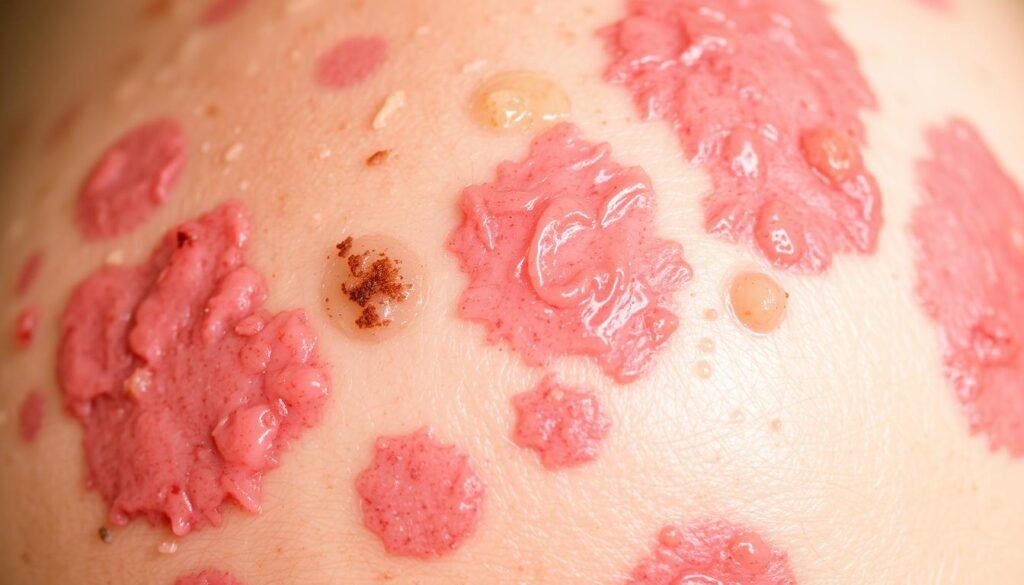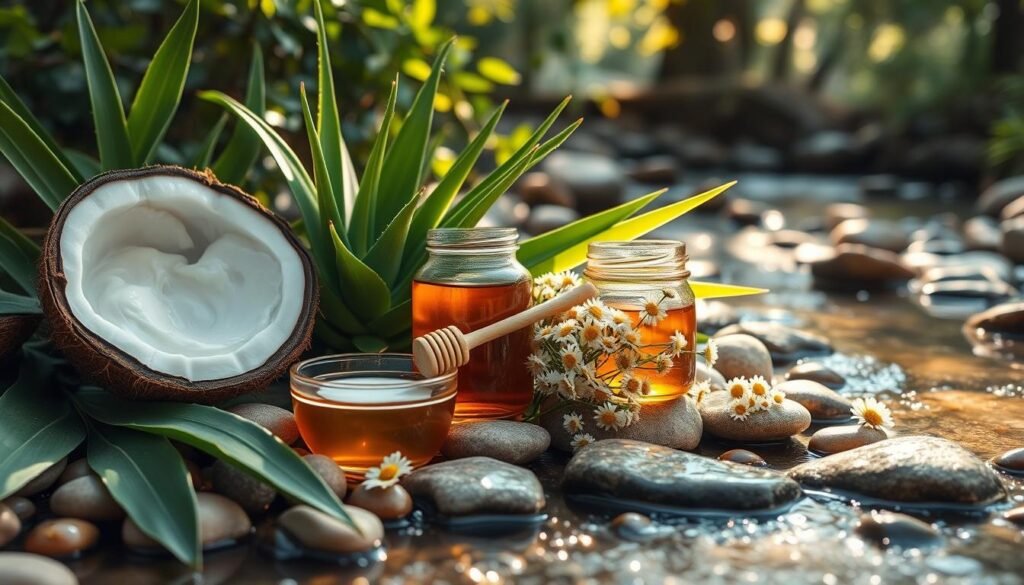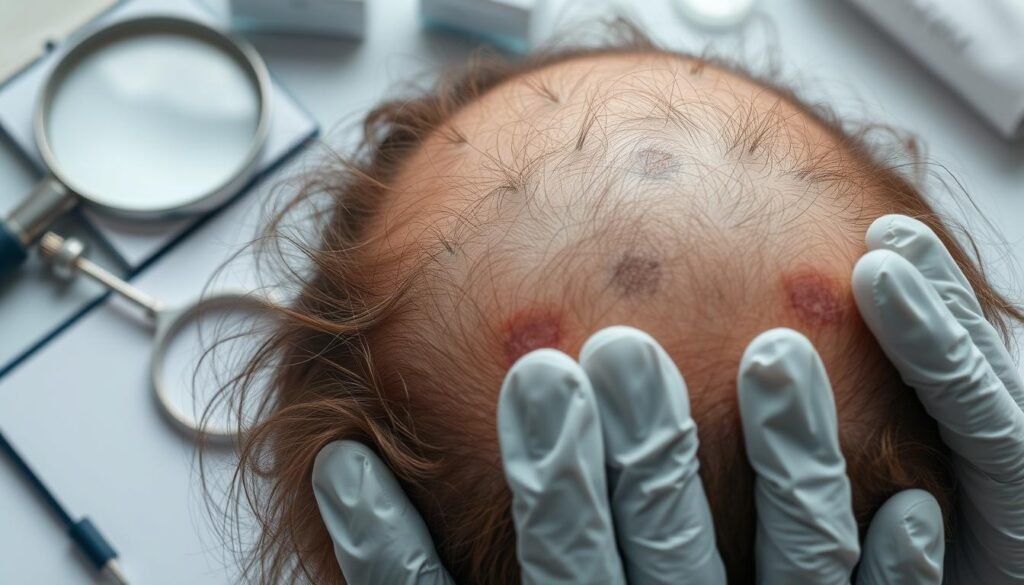Did you know that about 50% of coconut oil’s fat is lauric acid? This compound makes our skin absorb coconut oil better. This info highlights how natural oils can help with a dry itchy scalp. Many people quietly suffer from this, not addressing the root cause. This can lead to more scalp problems and discomfort. Knowing what irritates the scalp and keeping it moisturized can help. This way, people can improve their scalp’s health and stop the itch.
It’s crucial to find the right solutions for a dry, itchy scalp. This can change an annoying issue into something easy to handle. Factors like the environment, stress, or diet play a role. The right approach can lead to a healthier scalp. It can also help your hair be healthier overall.
Key Takeaways
- Nearly half of coconut oil’s fat content helps with absorption and soothing itchy scalps.
- Understanding the various causes is crucial in treating dry itchy scalp effectively.
- Natural remedies can offer relief and restore moisture to the scalp.
- A focus on maintaining healthy scalp conditions can enhance overall hair health.
- Targeted solutions can significantly reduce discomfort and promote a healthier scalp.
Understanding the Causes of Dry Itchy Scalp
Knowing why itchy scalp causes occur is key to treating them. Dry areas can make a dry scalp worse, leading to irritation. Conditions like eczema also impact scalp health, causing swelling and skin issues.
Stress and other internal factors can harm scalp health too. It makes scalp conditions like dandruff worse. This happens when yeast on our scalp grows too much. Stress, changes in our body, and poor diet can upset this balance.
Allergic reactions and conditions like scalp psoriasis are also to blame. They cause itchy, flaky skin. If symptoms are bad, seeing a dermatologist is a smart move. They can figure out what’s wrong.
Using special shampoos can help manage the itchiness and flakes. These shampoos have ingredients like zinc pyrithione and salicylic acid. Understanding what causes your itchy scalp can help you choose the right treatment.
To learn more about managing a dry itchy scalp, look for trusted sources. They offer helpful tips and advice.
Common Conditions Linked to Itchy Scalps
An itchy scalp can really affect how we feel every day. It can come from things like dandruff, seborrheic dermatitis, psoriasis, or scalp eczema. All these have different signs and need their own kind of care.
Dandruff makes your scalp shed skin flakes, causing itchiness and flakes in your hair. It can get worse from dry skin, bad reactions to hair products, or a fungus named Malassezia. Using a special anti-dandruff shampoo can help.
Seborrheic dermatitis shows up on the oilier spots of your body, like the scalp. It makes your skin red and inflamed, with greasy flakes. If you have it, you should use medicated shampoos and treatments to feel better.
Psoriasis on the scalp looks like thick, scaly patches. These plaques can itch or hurt. Using shampoos with coal tar or salicylic acid can control the symptoms well.
Scalp eczema, or atopic dermatitis, makes your skin dry and itchy. It can lead to inflammation and redness. Soothing creams and taking care of your skin carefully are important.
Other things like fungal infections, head lice, and allergies to hair products can also make your scalp itch. These problems cause more itching and discomfort. If you notice symptoms, it’s important to see a professional for the right diagnosis and treatment. For more info on itchy scalps, check out this link.
How Dandruff Affects Scalp Health
Dandruff affects many, with about half of adults worldwide experiencing it. It shows up as a flaky scalp that can be uncomfortable and embarrassing. The issue starts when too much fungus grows on the scalp. This leads to itching, irritation, and visible flakes. Men are more likely to have dandruff than women. Understanding what causes it is key.
The signs of dandruff are oily and dry flakes, irritated scalp spots, and sometimes, eyebrow dandruff. It can even lead to hair loss or dry flakes on the face. This harms a person’s scalp health and how they feel about themselves. Those with oily hair, or certain illnesses like Parkinson’s, or weakened immune systems are at a higher risk.
Keeping your scalp healthy means knowing if you have dandruff or just a dry scalp. Dandruff flakes are larger and yellowish, different from dry scalp’s tiny, white flakes. Good hygiene, effective dandruff treatments, and stress management can lessen dandruff. Products with ketoconazole or zinc pyrithione are helpful solutions.
Natural remedies like apple cider vinegar and coconut oil are also useful. Dandruff often begins in young adulthood and can continue into mid-life. While treatable, it requires ongoing care. Being aware and proactive about scalp health can improve one’s condition and boost confidence.
| Factor | Dandruff | Dry Scalp |
|---|---|---|
| Flake Size | Larger, yellow-tinged | Smaller, whiter |
| Oiliness | Oily scalp | Dry scalp |
| Common Symptoms | Itching, irritation, oily flakes | Itching, flaking, dry hair |
| Common Treatments | Over-the-counter shampoos | Moisturizing shampoos |
Scalp Conditions: Seborrheic Dermatitis and Its Impact
Seborrheic dermatitis mainly targets the scalp and oily parts of the body. This includes your face and chest. It shows up as flaky skin, oily spots with white or yellow scales, and an itchy scalp. The look of seborrheic dermatitis can change based on skin color. It may look darker on brown or Black skin, and redder on white skin.
Many factors can lead to seborrheic dermatitis. Stress, lack of sleep, and changes in the weather can make it worse. Health problems like Parkinson’s disease, depression, and immune disorders, including HIV, can make people more likely to get it. It affects 3 to 10 out of every 100 people in their lifetime. Adults between 30 to 60 years old are the most affected.
The exact cause of seborrheic dermatitis is still unknown. However, things like the yeast Malassezia, too much oil, and immune system issues might contribute. Despite not knowing all the reasons, we know it can cause a lot of skin irritation and discomfort. It can flare up repeatedly throughout someone’s life due to triggers like hormonal changes and certain medications.
- Symptoms include:
- Flaking skin and dandruff
- Oily patches on various parts of the body
- Itchiness
- Skin discoloration
In serious cases, seborrheic dermatitis can lead to more infections and weaken the skin’s defense system. However, it does not cause hair loss or turn into cancer. To treat it, there are medicated shampoos and creams available. One FDA-approved treatment is Zoryve.

Knowing more about seborrheic dermatitis and its symptoms aids in managing this ongoing issue. It helps lessen the problems caused by an itchy scalp and skin irritation.
Exploring Scalp Psoriasis: Symptoms and Treatments
Scalp psoriasis affects a lot of people, with as many as 80% seeing red, scaly patches. These can itch and hurt. If not treated, it can lead to temporary hair loss. This is why it’s important to find the right treatments.
Many things can make scalp psoriasis worse. These include genetics, being overweight, smoking, stress, and getting infections. Using certain medicines like lithium and prednisone can also cause problems. Knowing what makes it worse helps in controlling it.
Treatment depends on how bad the symptoms are and your overall health. For mild symptoms, creams like calcipotriene and tazorac are often used. For tougher cases, pills or shots that affect the immune system, like acitretin and Etanercept, might help.
Light therapy is also a choice. It uses special light to slow down skin cell growth and reduce redness. It’s good at easing itchiness and healing the skin.
Home remedies can also ease symptoms. Using things like aloe vera, apple cider vinegar, or oatmeal baths can help calm the skin. It’s key to not scratch or peel off the skin as it can lead to more harm.
| Treatment Type | Description |
|---|---|
| Topical Medications | Calcipotriene, betamethasone-calcipotriene, tazorac applied directly to the affected areas. |
| Oral Medications | Acitretin, methotrexate, and cyclosporine for moderate to severe cases. |
| Biologics | Medications like Etanercept and Infliximab for targeted immune response. |
| Phototherapy | Light therapy techniques to control growth of skin cells and reduce inflammation. |
| Home Remedies | Aloe vera, apple cider vinegar, coconut oil, oatmeal baths, and omega-3 supplements. |
Natural Remedies for Dry Itchy Scalp
Many natural remedies can help with a dry itchy scalp. These solutions also boost hair health. Using apple cider vinegar, coconut oil, and peppermint oil can soothe your scalp. They reduce irritation too.
Apple Cider Vinegar: A Soothing Solution
Apple cider vinegar is known for fighting off microbes. Mix it with water for an effective scalp rinse. It balances the scalp’s pH, cutting down itchiness. It also stops bacteria that can make scalp conditions worse.
Benefits of Coconut Oil for Scalp Moisture
Coconut oil is a super moisturizer because it’s full of lauric acid. It fights scalp itch, even from lice. Using it as a leave-in treatment moisturizes the scalp well. People love it for natural dryness relief.
Using Peppermint Oil for Itch Relief
Peppermint oil cools and lessens scalp discomfort. A study showed less itchiness with twice-daily use. It also makes the scalp healthy for hair to grow.

Over-the-Counter Treatments to Consider
Struggling with a dry itchy scalp can be bothersome. Knowing about effective over-the-counter treatments can really help. These options target issues like dandruff and scalp psoriasis. They often contain ingredients such as zinc pyrithione and salicylic acid to improve scalp health.
Zinc Pyrithione: Efficacy in Fighting Dandruff
Zinc pyrithione attacks the yeast known as Malassezia, which causes dandruff. It’s shown to lessen dandruff’s flakiness and itchiness. Folks have seen their scalp condition get better after regular use of products with zinc pyrithione. For more on treating a dry scalp, visit this resource.
Salicylic Acid: How It Helps with Flakiness
Salicylic acid is great for dealing with flaky scalp issues. It removes dead skin, helping relieve dryness. People using salicylic acid shampoos often see a cleaner, flake-free scalp quickly. When picking products, checking labels for these ingredients helps find good solutions. For additional tips on easing scalp discomfort, check out this website.
When to Seek Medical Attention for Scalp Issues
If you keep having scalp problems, it’s smart to see a doctor before it gets worse. Having things like really bad itching, sores, or painful spots should make you see a skin doctor. It’s really important to deal with these symptoms early.
If your scalp starts looking different, like if it’s flaky or red all the time, you should get it checked. Things like psoriasis can get worse because of sickness or stress. Seeing a skin doctor soon helps a lot in taking care of your scalp.
Ignoring scalp problems can lead to bigger issues. For example, not protecting your head from the sun can cause actinic keratoses (AKs). These can turn into a type of skin cancer if not treated. This problem is more common in people over 50, who might already be losing hair.
If your scalp issues come with other problems, like losing weight without trying or always feeling tired, you should see a doctor. Diseases like alopecia areata make your hair fall out and need special treatments.
In short, don’t ignore if your scalp feels bad or looks different. Going to a dermatologist is the best way to find out what’s wrong and how to fix it. For tips on dandruff treatment, including medicated shampoos, check out this site.

| Symptoms | Considerations |
|---|---|
| Severe Itching | Can indicate conditions like psoriasis or eczema. |
| Painful Lesions | May require immediate dermatological evaluation. |
| Noticeable Changes | Flakiness or redness could suggest underlying disorders. |
| Hair Loss Patterns | Analysis for genetic or autoimmune conditions is necessary. |
| Sun Damage | Regular check-ups to prevent AKs from progressing are essential. |
Home Care Tips for Maintaining Scalp Health
To have a healthy scalp, there are several simple things you can do at home. A regular routine can help keep your scalp moist. It will also stop it from getting dry and itchy. Let’s look at some helpful tips:
- Drinking four to six cups of water every day helps keep your scalp moist.
- Brushing your hair often spreads natural oils. This makes your scalp healthier and your hair shinier.
- Try not to use too many heavy styling products. They can cause buildup and irritation.
- Use shampoos with good ingredients like zinc or salicylic acid. They help fight dandruff and irritation.
- Eating foods with omega-3 fatty acids can help control oil and keep your scalp moist.
- Pick gentle, fragrance-free products. They lower the chance of allergic reactions that can bother your scalp.
Things like pollution and the sun can also damage the scalp. Wearing hats and using humidifiers can protect it. Daily stress management, like meditation, can prevent stress-related scalp problems.
The table below shows effective products for scalp health:
| Product | Function | Price |
|---|---|---|
| Neutrogena Scalp Therapy Anti-Dandruff Shampoo | Controls dandruff buildup | $10 |
| L’Oréal Paris EverPure Scalp Care + Detox Shampoo | Sulfate-free cleansing | $12 |
| Act+Acre Cold Processed Scalp Detox | Nourishing detox treatment | $48 |
| Authentic Beauty Concept Hydrating Jelly Mask | Deep hydration for scalp | $38 |
By following these tips, you can improve your scalp’s moisture and health. This leads to better looking and feeling hair.
Conclusion
Dry itchy scalp problems need a clear understanding of causes and solutions. We need to look at our skincare and hair product choices. Knowing about dandruff, seborrheic dermatitis, and health issues helps us find good treatments. It’s key to take care of our scalp health for comfort and well-being.
Many treatments can help with itchy scalp. You can try natural things like coconut oil or apple cider vinegar. There are also great products with zinc pyrithione and salicylic acid. But if problems stay, it’s smart to see professionals like those at Ayana Dermatology & Aesthetics. They can give advice that fits your needs.
Good hair care and maybe changing your routine are key for a healthy scalp. Paying attention to what you eat helps too. Knowing more about scalp health lets you make better choices. This leads to less discomfort and a healthier scalp.